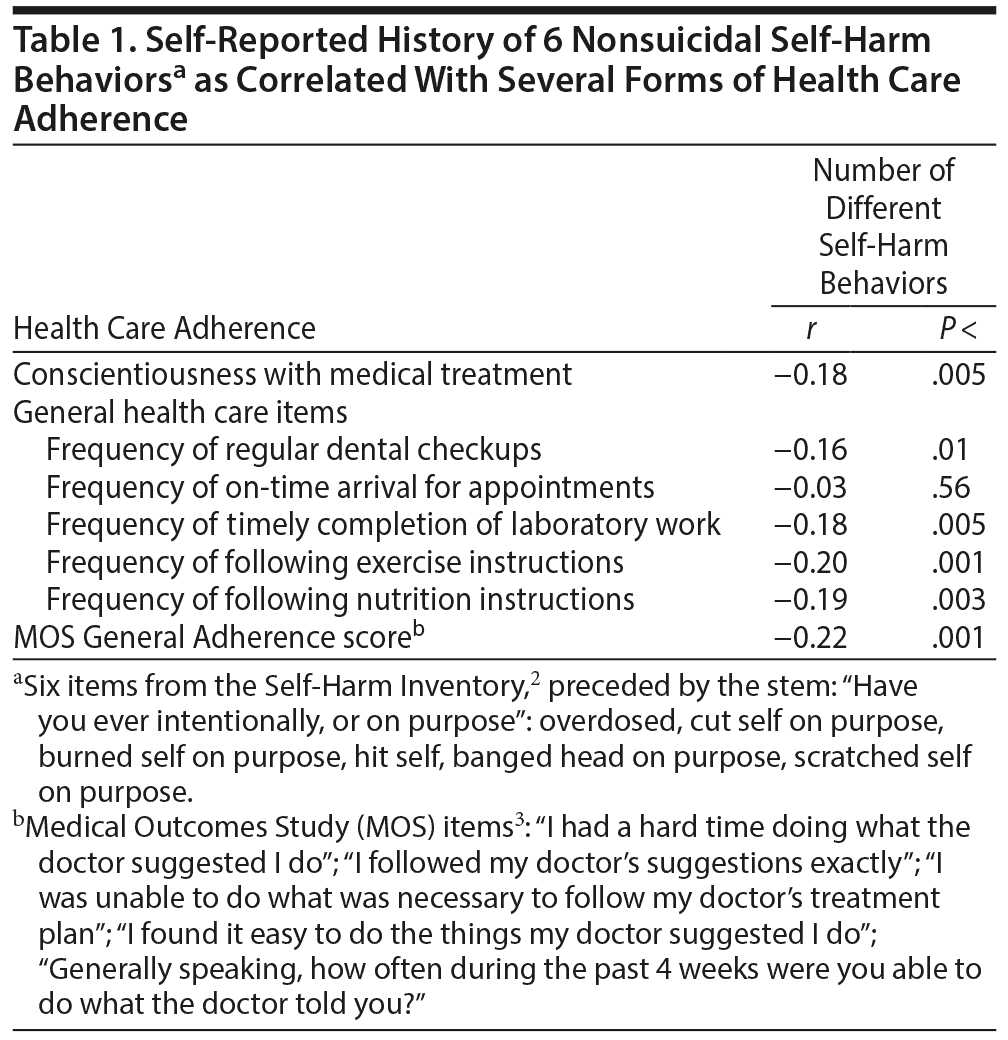Because this piece does not have an abstract, we have provided for your benefit the first 3 sentences of the full text.
To the Editor: Few studies have examined nonsuicidal self-harm behaviors in relationship to general health care adherence. In the 1 study we located, completion of outpatient mental health treatment among inpatients with nonsuicidal self-harm behavior was 50%-60% (ie, relatively low). Accordingly, we examined 6 nonsuicidal self-harm behaviors in relationship to 3 measures of general health care adherence in a primary care sample.
History of Nonsuicidal Self-Harm Behavior and General Health Care Adherence Among Primary Care Outpatients
To the Editor: Few studies have examined nonsuicidal self-harm behaviors in relationship to general health care adherence. In the 1 study we located,1 completion of outpatient mental health treatment among inpatients with nonsuicidal self-harm behavior was 50%-60% (ie, relatively low). Accordingly, we examined 6 nonsuicidal self-harm behaviors in relationship to 3 measures of general health care adherence in a primary care sample.
Method. The adult participants in this study were being seen by mostly resident providers in an internal medicine outpatient clinic for non-emergent medical care. We excluded individuals with compromising medical, intellectual, cognitive, or psychiatric symptoms of a severity to preclude the candidate’s ability to successfully complete a survey (n = 5). Exclusion assessment was informal and undertaken by the recruiter as patients registered for clinical service (surveys needed to be completed before appointments with providers).
Of 354 individuals approached, 300 agreed to participate (84.7%). Among participants, 263 completed relevant study items: 206 (78.3%) women and 57 (21.7%) men, ages 18 to 89 years (mean = 45.09, SD = 13.92). Most participants were white (84.6%), followed by black (8.0%). All but 6.1% had at least graduated high school and 11.0% had earned at least a bachelor’s degree.
During clinic hours, one of the authors (R.J.B.) approached patients after registration, informally assessed exclusion criteria, reviewed the project focus with potential candidates, and invited each to participate by completing a 5-page anonymous survey and placing the completed surveys into sealed envelopes and then into a collection box in the lobby.
In addition to demographics and queries about 6 self-harm behaviors from the Self-Harm Inventory2 (see Table 1), the survey contained the following health care adherence items:
- The question: "In general, how conscientious are you about following through with medical treatment?" with 5 Likert-style response options from "very conscientious" to "not conscientious at all."
- Five queries about general health care behaviors (eg, regular dental checkups, arrival to doctors’ appointments on time, completion of laboratory work, adherence with exercise instructions, adherence with diet instructions), with 5 Likert-style response options from "never" to "always" as well as "not applicable."
- The Medical Outcomes Study (MOS) General Adherence Items,3 which explores general medical adherence with "my doctor" over the past 4 weeks (see Table 1).
All items were recoded such that higher scores indicate higher levels of adherence.
This project was exempted by the institutional review boards of the sponsoring hospital and the local university. Completion of the survey was assumed to be implied consent (explained to participants on the cover page).
Results. Of the 263 respondents, 73 (27.8%) reported at least 1 of the 6 nonsuicidal self-harm behaviors. Given that only 6 endorsed 5 or 6 of the behaviors, the number of behaviors was truncated at 4 to prevent these few outliers from exerting undue statistical influence. Thereafter, 190 respondents denied all 6 forms of nonsuicidal self-harm behavior; 29 endorsed 1 behavior; 13, 2 behaviors; 14, 3 behaviors; and 17, 4 or more behaviors.
Correlations between the number of nonsuicidal self-harm behaviors endorsed and scores on the measures of health care adherence are presented in Table 1. With 1 exception (frequency of on-time arrival for appointments), respondents who reported more nonsuicidal self-harm behaviors tended to report less health care adherence.
Findings indicate that individuals who engage in nonsuicidal self-harm behaviors are less likely to be adherent with general health care—a novel finding compared with the literature. Potential limitations of this study include the self-report nature of the data, use of limited health care adherence variables, and the sample characteristics (patients from a resident clinic). However, findings appear clinically relevant.
REFERENCES
1. Murphy E, Steeg S, Cooper J, et al. Assessment rates and compliance with assertive follow-up after self-harm: cohort study. Arch Suicide Res. 2010;14(2):120-134. PubMed doi:10.1080/13811111003704662
2. Sansone RA, Wiederman MW, Sansone LA. The Self-Harm Inventory (SHI): development of a scale for identifying self-destructive behaviors and borderline personality disorder. J Clin Psychol. 1998;54(7):973-983. PubMed doi:10.1002/(SICI)1097-4679(199811)54:7<973::AID-JCLP11>3.0.CO;2-H
3. Hayes RD. The Medical Outcomes Study (MOS) Measures of Patient Adherence. http://www.rand.org/content/dam/rand/www/external/health/surveys_tools/mos/
mos_adherence_survey.pdf. Accessed on April 14, 2014.
Author affiliations: Departments of Psychiatry and Internal Medicine, Wright State University School of Medicine, Dayton, Ohio, and Department of Psychiatry Education, Kettering Medical Center, Kettering, Ohio (Dr Sansone); Department of Internal Medicine, Kettering Medical Center, Dayton, Ohio (Dr Bohinc); and Faculty Development, the University of South Carolina School of Medicine, Greenville, South Carolina (Dr Wiederman).
Potential conflicts of interest: None reported.
Funding/support: None reported.
Published online: September 17, 2015.
Prim Care Companion CNS Disord 2015;17(5):doi:10.4088/PCC.15l01787
© Copyright 2015 Physicians Postgraduate Press, Inc.
Enjoy this premium PDF as part of your membership benefits!






